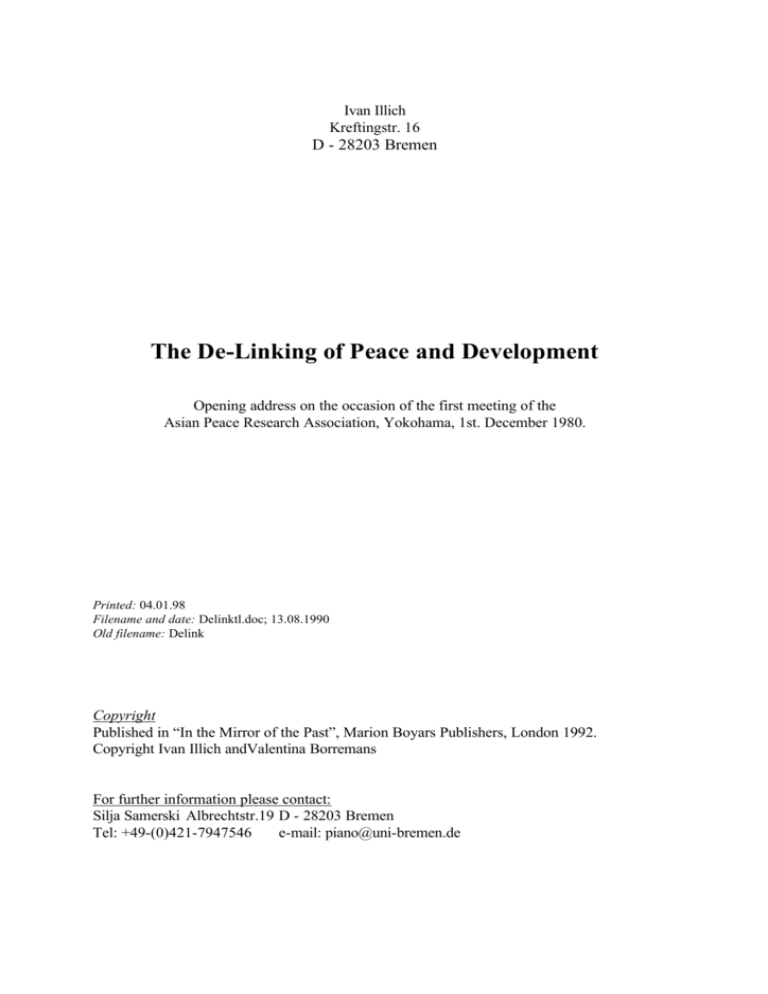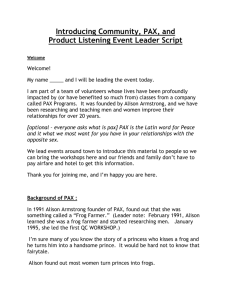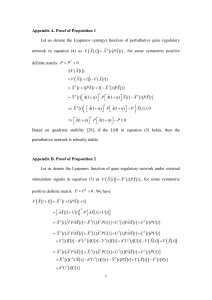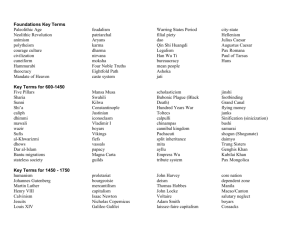The De-Linking of Peace and Development
advertisement

Ivan Illich Kreftingstr. 16 D - 28203 Bremen The De-Linking of Peace and Development Opening address on the occasion of the first meeting of the Asian Peace Research Association, Yokohama, 1st. December 1980. Printed: 04.01.98 Filename and date: Delinktl.doc; 13.08.1990 Old filename: Delink Copyright Published in “In the Mirror of the Past”, Marion Boyars Publishers, London 1992. Copyright Ivan Illich andValentina Borremans For further information please contact: Silja Samerski Albrechtstr.19 D - 28203 Bremen Tel: +49-(0)421-7947546 e-mail: piano@uni-bremen.de Ivan Illich: The De-Linking of Peace and Development 2 THE DE-LINKING OF PEACE AND DEVELOPMENT Opening address on the occasion of the first meeting of the Asian Peace Research Association. Yokohama, 1st. December, 1980. Professor Yoshikazu Sakamoto. Your invitation to open this series of keynote speeches on the occasion of the foundation of the Asian Peace Research Association, both honours and frightens me. I thank you for such trust, but also beg your forbearance for my ignorance of things Japanese. This is the first time that I give a public speech in a country of whose language I am totally ignorant. You have invited me to speak on a subject which eludes the modern use of certain English terms. Violence now lurks in many key words of the English language. John F. Kennedy could wage war on poverty; pacifists now plan strategies (literally, war plans) for peace. In this language, currently shaped for aggression, I must talk to you about the recovery of a true sense of peace, and bearing in mind always that I know nothing about your vernacular tongue. Therefore, each word I speak today will remind me of the difficulty of putting peace into words. To me, it seems that each people's peace is as distinct as each people's poetry. Hence, the translation of peace is a task as arduous as the translation of poetry. Peace has a different meaning for each epoch and for each culture area. This is a point on which Professor Takeshi Ishida has written. And, as he reminds us, within each culture area peace means something different at the center and on the margins. At the center, the emphasis is on "peace keeping"; on the margin, people hope to be "left in peace." During three so-called Development Decades, the latter meaning, people's peace, has lost out. This is my main thesis: under the cover of "development," a worldwide war has been waged against people's peace. In developed areas today, not much is left of the people's peace. I believe that limits to economic development, originating at the grass roots, are the principal condition for people to recover their peace. Culture has always given meaning to peace. Each ethnos -people, community, culture - has been mirrored, symbolically expressed and reinforced by its own ethos - myth, law, goddess, ideal - of peace. Peace is as vernacular as speech. In the examples chosen by Professor Ishida, this correspondence between ethnos and ethos appears with great clarity. Take the Jews; look at the Jewish patriarch when he raises his arms in blessing over his family and flock. He invokes shalom, which we translate as peace. He sees shalom as grace, flowing from heaven, "like oil dripping through the beard of Aaron the forefather." For the Semitic father, peace is the blessing of justice which the one true God pours over the twelve tribes of recently settled shepherds. To the Jew, the angel announces "shalom," not the Roman pax. Roman peace means something utterly different. When the Roman governor raises the ensign of his legion to ram it into the soil of Palestine, he does not look towards heaven. He faces a far-off city; he imposes its law and its order. There is nothing in common between shalom and this pax romana, though both exist in the same place and time. Ivan Illich: The De-Linking of Peace and Development 3 In our time, both have faded. Shalom has retired into a privatized realm of religion, and pax has invaded the world as "peace," paix, pace. Through two thousand years of use by governing elites, pax has become a polemical catchall. The term was exploited by Constantine to turn the cross into ideology. Charlemagne utilized it to justify the genocide of the Saxons. Pax was the term employed by Innocent III to subject the sword to the cross. In modern times, leaders manipulate it to put the party in control of the army. Spoken by both St. Francis and Clemenceau, pax has now lost the boundaries of its meaning. It has become a sectarian and proselytizing term, whether used by the establishment or by dissidents, whether its legitimacy is claimed by the East or the West. The idea of pax has a colorful history, in spite of the fact that little research has been done on it. Historians have been more occupied filling library shelves with treatises on war and its techniques. Huo'ping and Shanti seem to have meanings today which are not unlike those of the past. But between them there is a gulf; they are not comparable at all. The Huo'ping of the Chinese means smooth, tranquil harmony within the hierarchy of the heavens, while the Shanti of the Indians refers primarily to intimate, personal, cosmic nonhierarchic awakening. In short, there is no "identity" in peace. In its concrete sense, peace places the "I" into the corresponding "we." But in each language area, this correspondence is different. Peace fixes the meaning of the first person plural. By defining the form of the exclusive "we" (the kami of the Malay languages), peace is the base on which the inclusive "we" (the kita) of the Malay languages comes naturally to most speakers around the Pacific. It is a grammatical difference utterly foreign to Europe, and completely lacking in western pax. Modern Europe's undifferentiated "we" is semantically aggressive. Therefore, Asian research cannot be too wary of pax, which has no respect for kita, the Adat. Here in the Far East it should be easier than in the West to base peace research on what ought perhaps to be its fundamental axiom: War tends to make cultures alike whereas peace is that condition under which each culture flowers in its own incomparable way. From this it follows that peace cannot be exported; it is inevitably corrupted by transfer; its attempted export means war. When peace research neglects this ethnological truism, it turns into a technology of peace keeping: either degraded into some kind of moral rearmament, or perverted into the negative polemology (war science) of the high brass and their computer games. Peace remains unreal, merely an abstraction, unless it stands for an ethnos-anthropological reality. But it would remain equally unreal if we did not attend to its historical dimension. Until quite recently war could not totally destroy peace, could not penetrate all levels of peace, because the continuation of war was based on the survival of the subsistence cultures which fed it. Traditional warfare depended on the continuation of people's peace. Too many historians have neglected this fact; they make history appear as a tale of wars. This is clearly true of classical historians, who tend to report on the rise and fall of the powerful. Unfortunately, it is equally true for many of the newer historians who want to act as reporters from the camps of those who never made it, who want to tell the tales of the Ivan Illich: The De-Linking of Peace and Development 4 vanquished, to evoke the images of those who have disappeared. Too often these new historians are more interested in the violence rather than the peace of the poor. They primarily chronicle resistance, mutinies, insurgencies, riots of slaves, peasants, minorities, marginals; in more recent times, the class struggles of proletarians and the discrimination battles of women. In comparison with the historians of power, the new historians of popular culture have a difficult task. Historians of elite cultures, of wars waged by armies, write about the centers of cultural areas. For their documentation they have monuments, decrees engraved in stone, commercial correspondence, the autobiographies of kings and the firm trails made by marching armies. Historians from the losing camp have no evidence of this kind. They report on subjects which often have been erased from the face of the earth, on people whose remains have been stamped out by their enemies, or blown away by the wind. The historians of peasantry and nomads, of village culture and home life, of women and infants, have few traces to examine. They must reconstruct the past from hunches, must be attentive to hints which they find in proverbs, riddles and songs. Often the only verbatim records left behind by the poor, especially women, are the responses made by witches and rogues under torture, statements recorded by the courts. Modern anthropological history (the history of popular cultures, l'histoire des mentalités) has had to develop techniques to make these odd remnants intelligible. But this new history often tends to focus on war. It portrays the weak principally in their confrontations with those against whom they must defend themselves. It recounts stories of resistance and only by implication reports on the peace of the past. Conflict makes opponents comparable; it introduces simplicity into the past; it fosters the illusion that what has gone before can be related in 20th-century uniquack. Thus war, which makes cultures alike, is all too often used by historians as the framework or skeleton of their narratives. Today there is a desperate need for the history of peace, a history infinitely more diverse than the story of war. What is now designated peace research very often lacks historical perspective. The subject of this research is "peace," purged of its cultural and historical components. Paradoxically, peace was turned into an academic subject just when it had been reduced to a balance between sovereign, economic powers acting under the assumption of scarcity. Thus study is restricted to research on the least violent truce between competitors locked into a zero sum game. Like searchlights, the concepts of this research focus on scarcity. But in the process of such research, the peaceful enjoyment of that which is not scarce, people's peace, is left in a zone of deep shadow. The assumption of scarcity is fundamental to economics, and formal economics is the study of values under this assumption. But scarcity, and therefore all which can be meaningfully analyzed by formal economics, has been of maginal importance in the lives of most people through-most of history. The spread of scarcity into all aspects of life can be chronicled; it occurred in European civilization since the Middle Ages. Under the expanding assumption Ivan Illich: The De-Linking of Peace and Development 5 of scarcity, peace acquired a new meaning, a meaning without precedent anywhere but in Europe. Peace came to mean pax economica. Pax economica is a balance between formally "economic" powers. The history of this new reality deserves our attention. And the process through which pax economica monopolized the meaning of peace is especially important. This is the first meaning of peace to achieve worldwide acceptance. And such a monopoly ought to be deeply worrisome. Therefore, I want to contrast pax economica with its opposite, and complement, popular peace, in this paper. Since the establishment of the United Nations, peace has been progressively linked with development. Previously this linkage had been unthinkable. The novelty of it can hardly be understood by people under forty. The curious situation is more easily intelligible for those who were, like myself, adults on January 10, 1949, the day President Harry Truman announced the Point Four Program. On that day most of us met the term "development" for the first time in its present meaning. Until then we had used development to refer to species, to real estate and to moves in chess. But since then it can refer to people, to countries and to economic strategies. And in less than a generation we were flooded with conflicting development theories. By now, however, most of them are merely curiosities for collectors. You may remember, with some embarrassment, how generous people were urged to make sacrifices for a succession of programs aimed at "raising per capita income," "catching up with the advanced countries," "overcoming dependencies." And you now wonder at the many things once deemed worthy of export: "achievement orientation," "atoms for peace," "jobs," "windmills" and, currently, "alternative life styles" and professionally supervised "self-help." Each of these theoretical incursions came in waves. One brought the self-styled pragmatists who emphasized enterprise, the other would-be politicians who relied on "conscientizing" people into the foreign ideology. Both camps agreed on growth. Both advocated rising production and increased dependence on consumption. And each camp with its sect of experts, each assembly of saviors always linked its own scheme for development to peace. Concrete peace, by thus being linked to development, became a partisan goal. And the pursuit of peace through development became the overarching unexaminable axiom. Anyone who opposed economic growth, not this kind or that, but economic growth as such, could be denounced as an enemy of peace. Even Gandhi was cast into the role of the fool, the romantic or the psychopath. And worse, his teachings were perverted into so-called nonviolent strategies for development. His peace, too, was linked to growth. Khadi was redefined as a "commodity," and non-violence as an economic weapon. The assumption of the economist, that values are not worth protecting unless they are scarce, has turned pax economica into a threat to people's peace. The linkage of peace to development has made it difficult to challenge the latter. Let me suggest that such a challenge should now be the main task of peace research. And the fact that development means different things to different people is no obstacle. It means one thing to trans-national corporation executives, another to ministers of the Warsaw pact, and Ivan Illich: The De-Linking of Peace and Development 6 something other again to the architects of the New International Economic Order. But the convergence of all parties on the need for development has given the notion a new status. This agreement has made of development the condition for the pursuit of the 19th- century ideals of equality and democracy, with the proviso that these be restricted within the assumptions of scarcity. Under the disputes around the issue of "who gets what" the unavoidable costs inherent in all development have been buried. But during the seventies one part of these costs has come to light. Some obvious "truths" suddenly became controversial. Under the ecology label, the limits of resources, of tolerable poison and stress, became political issues. But the violent aggression against the environment's utilization value has so far not been sufficiently disinterred. To expose the violence against subsistence which is implicit in all further growth, and which is veiled by pax economica, seems to me a prime task of radical peace research. In both theory and practice all development means the transformation of subsistenceoriented cultures and their integration into an economic system. Development always entails the expansion of a formally economic sphere at the cost of subsistence-oriented activities. It means the progressive "disembedding" of a sphere in which exchange takes place under the assumption of a zero sum game. And this expansion proceeds at the cost of all other, traditional forms of exchange. Thus development always implies the propagation of scarcity-dependence on goods and services perceived as scarce. Development necessarily creates a milieu from which the conditions for subsistence activities have been eliminated in the process of making the milieu over into a resource for the production and circulation of commodities. Development thus inevitably means the imposition of pax economica at the cost of every form of popular peace. To illustrate the opposition between people's peace and pax economica, let me turn to the European Middle Ages. In so doing, I emphatically do not advocate a return to the past. I look at the past only to illustrate the dynamic opposition between two complementary forms of peace, both formally recognized. I explore the past rather than some social science theory to avoid utopian thinking and a planning mentality. The past is not, like plans and ideals, something which might possibly come about. It allows me to stand on fact when I look at the present. I turn toward the European Middle Ages because it was near their end that a violent pax economica assumed its shape. And the replacement of people's peace by its engineered counterfeit, pax economica, is one of Europe's exports. In the 12th century, pax did not mean the absence of war between lords. The pax that Church or Emperor wanted to guarantee was not primarily the absence of armed encounters between knights. Pax, for peace, meant to protect the poor and their means of subsistence from the violence of war. Peace protected the peasant and the monk. This was the meaning of Gottesfrieden, of Landfrieden. It protected specific times and places. No matter how bloody the conflict among lords, peace protected the oxen and grain on the stem. It safeguarded the emergency granary, the seed and the time of harvest. Generally Ivan Illich: The De-Linking of Peace and Development 7 speaking, the "peace of the land" shielded the utilization values of the common environment from violent interference. It ensured access to water and pasture, to woods and livestock, for those who had nothing else from which to draw their subsistence. The "peace of the land" was thus distinct from the truce between warring parties. This primarily subsistenceoriented significance of peace was lost with the Renaissance. With the rise of the nation-state, an entirely new world began to emerge. This world ushered in a new kind of peace and a new kind of violence. Both its peace and its violence are equally distant from all the forms of peace and violence which had previously existed. Whereas peace had formerly meant the protection of that minimal subsistence on which the wars among lords had to be fed, henceforth subsistence itself became the victim of an aggression, supposedly peaceful. Subsistence became the prey of expanding markets in services and goods. This new kind of peace entailed the pursuit of a utopia. Popular peace had protected precarious but real communities from total extinction. But the new peace was built around an abstraction. The new peace is cut to the measure of homo economicus, universal man, made by nature to live on the consumption of commodities produced elsewhere by others. While the pax populi had protected vernacular autonomy, the environment in which this could thrive and the variety of patterns for its reproduction, the new pax economica protected production. It ensures aggression against popular culture, the commons and women. First, pax economica cloaks the assumption that people have become incapable of providing for themselves. It empowers a new elite to make all people's survival dependent on their access to education, health care, police protection, apartments and supermarkets. In ways previously unknown, it exalts the producer and degrades the consumer. Pax economica labels the subsistent as "unproductive," the autonomous as "asocial," the traditional as "underdeveloped." It spells violence against all local customs which do not fit a zero sum game. Secondly, pax economica promotes violence against the environment. The new peace guarantees impunity - the environment may be used as a resource to be mined for the production of commodities, and as a space reserved for their circulation. It does not just permit, but encourages the destruction of the commons. People's peace had protected the commons. It guarded the poor man's access to pastures and woods; it safeguarded the use of the road and the river by people; it reserved to widows and beggars exceptional rights for utilizing the environment. Pax economica defines the environment as a scarce resource which it reserves for optimal use in the production of goods and the provision of professional care. Historically, this is what development has meant: starting from the enclosure of the lord's sheep and reaching to the enclosure of streets for the use of cars and to the restriction of desirable jobs to those with more than twelve years of schooling. Development has always signified a violent exclusion of those who wanted to survive without dependence on consumption from the environment's utilization values. Pax economica bespeaks war against the commons. Ivan Illich: The De-Linking of Peace and Development 8 Thirdly, the new peace promotes a new kind of war between the sexes. The transition from the traditional battle for dominance to this new all-out war between men and women is probably the least analyzed of economic growth's side effects. This war, too, is a necessary outcome of the so-called growth of productive forces, a process implying an increasingly complete monopoly of wage labor over all other forms of work. And this, too, is aggression. The monopoly of wage-related work entails aggression against a feature common to all subsistence-oriented societies. Though these societies be as different from each other as those of Japan, France and Fiji, one central characteristic is common to all of them: all tasks relevant to subsistence are assigned in a gender-specific way, to either men or women. The set of specific tasks which are necessary and culturally defined vary from society to society. But each society distributes the various possible tasks to either men or women, and does so according to its own unique pattern. In no two cultures is the distribution of tasks within a society the same. In each culture, "growing up" means to grow into the activities characteristic there, and only there, of either man or woman. To be a man or a woman in pre-industrial societies is not a secondary trait added on to genderless humans. It is the most fundamental characteristic in every single action. To grow up does not mean to be "educated," but to grow into life by acting as a woman or as a man. Dynamic peace between men and women consists precisely in this division of concrete tasks. And this does not signify equality; it establishes limits to mutual oppression. Even in this intimate domain, people's peace limits both war and the extent of domination. Wage labor destroys this pattern. Industrial work, productive work, is conceived as neutral and often experienced as such. It is defined as genderless work. And this is true whether it is paid or unpaid, whether its rhythm is determined by production or by consumption. But even though work is conceived as genderless, access to this activity is radically biased. Men have primary access to the paid tasks which are viewed as desirable and women are assigned those left over. Originally, women were the ones forced into unpaid shadow work, although men are now increasingly given these tasks, too. As a consequence of this neutralization of work, development inevitably promotes a new kind of war between the sexes, a competition between theoretical equals of whom half are handicapped by their sex. Now we see a competition for wage labor, which has become scarce, and a struggle to avoid shadow work, which is neither paid nor capable of contributing to subsistence. Pax economica protects a zero sum game, and ensures it undisturbed progress. All are coerced to become players and to accept the rules of homo economicus. Those who refuse to fit the ruling model are either banished as enemies of the peace, or educated until they conform. By the rules of the zero sum game, both the environment and human work are scarce stakes; as one gains the other loses. Peace is now reduced to two meanings: the myth that, at least in economics, two and two will one day make five, or a truce and deadlock. Development is the name given to the expansion of this game, to the incorporation of more players and of their resources Therefore, the monopoly of pax economica must be deadly; and there must be some peace other than the one linked to development. One can concede that pax economica is not without some positive value - Ivan Illich: The De-Linking of Peace and Development 9 bicycles have been invented and their components must circulate in markets different from those in which pepper was formerly traded. And peace among economic powers is at least as important as peace between the warlords of ancient times. But the monopoly of this elite peace must be questioned. To formulate this challenge seems to me the most fundamental task of peace research today.






